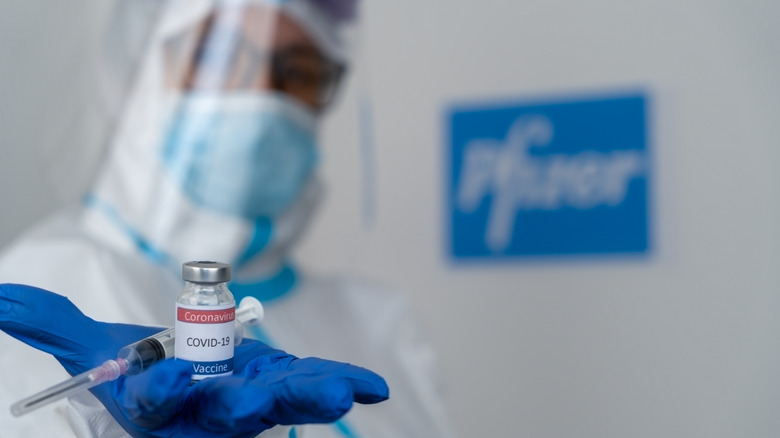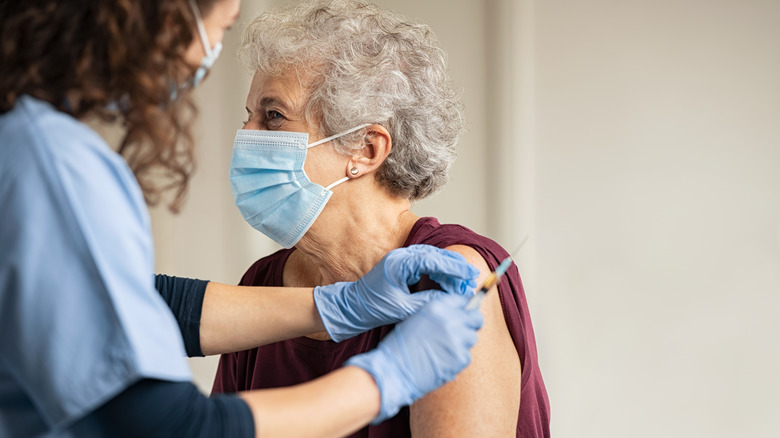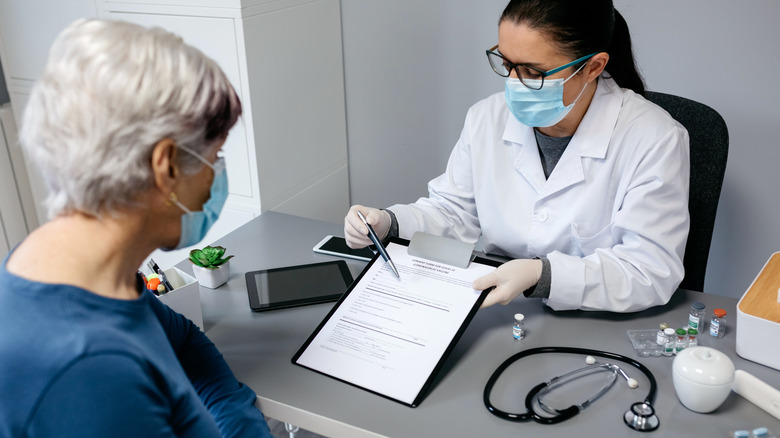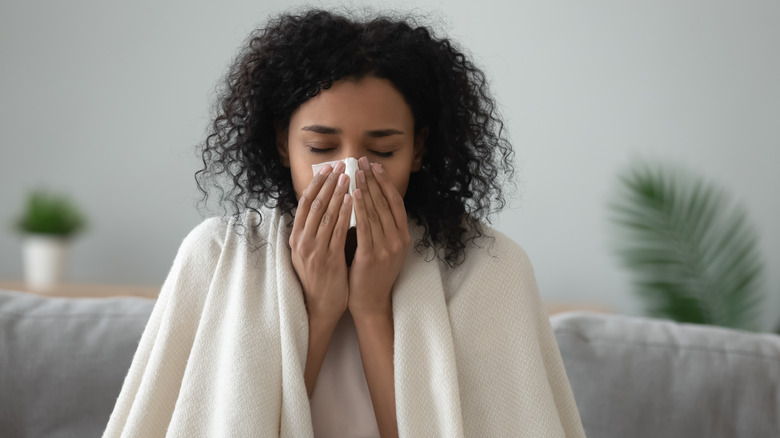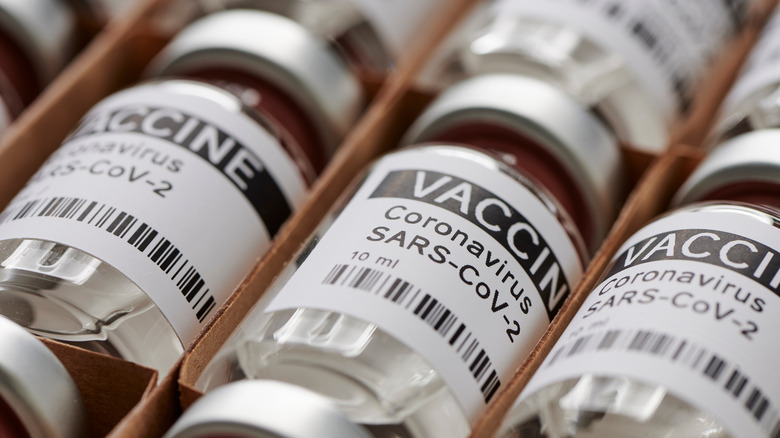Side Effects Of The Pfizer Vaccine For COVID-19 Explained
As more and more people are vaccinated for the COVID-19 virus — coupled with the changes in Center for Disease Control and Prevention's guidance for fully vaccinated people — many questions surrounding vaccinations have developed. The most prominent question for those awaiting vaccination is, "What potential side effects can I expect?" The key word there is "potential," meaning you may not experience any side effects or symptoms after vaccination. Some health experts have said mild side effects are in some ways, a positive occurrence and show that your immune system is responding to the vaccine (via AARP).
The most commonly reported vaccine side effect is soreness at the injection site (via Women's Health). The side effects can vary based on factors like your individual health and even age. As of right now, there are three vaccinations available in the United States: Moderna, Pfizer-BioNTech, and Johnson & Johnson.
Facts about the Pfizer vaccine
First, let's unload facts about the Pfizer vaccine. The vaccine is commonly called Pfizer-BioNTech, due to the name of its manufacturer — Pfizer, Inc. and BioNTech (via CDC). This vaccination is given in a two-shot format, 21 days apart. The Pfizer vaccine is also an mRNA, or messenger RNA, vaccine. It introduces a molecule that then tells cells to make a protein from the COVID-19 virus. This triggers the immune system response, creating antibodies and longer lasting immunity to fight off future infections (via Medical News Today).
The Pfizer vaccine is also effective at preventing the risk of contracting COVID-19 — 95% effective for those without evidence of a previous infection, according to the CDC. It does not contain allergens like eggs, preservatives, or latex. The vaccine is recommended to those ages 12 and up who haven't experienced severe or immediate allergic reactions to any ingredient in an mRNA COVID-19 vaccine.
Possible side effects of the Pfizer vaccine
Those who report side effects to the Pfizer vaccine usually experience them within a day or two of receiving the vaccine. According to the CDC, these flu-like side effects may interfere with your normal daily routine, but you should expect symptoms to cease within a few days.
Common side effects are pain, redness, and swelling at the shot injection site. You may also experience chills, fever, headache, nausea, muscle pain, or tiredness throughout your body (via the CDC). Some less common side effects reported are allergic reactions, joint and muscle pain, and swollen lymph nodes, according to Medical News Today.
According to the U.S. Food and Drug Administration (FDA), there is a "remote chance" the Pfizer vaccine could cause a severe allergic reaction within a few minutes to one hour after receiving a dose. Signs of a severe reaction can include dizziness, difficulty breathing, fast heartbeat, swelling at the face and throat, full-body rash, and weakness.
Why do some experience side effects?
Side effects are reported to be more common after the second dose of the Pfizer vaccine. Experts say that this is normal and is likely because your immune system is ready to respond the second time (via Women's Health). There are also reports that older people may experience fewer side effects with the Pfizer and Moderna vaccines than younger people, according to AARP. The reasoning is still up for debate, but researchers say it could be related to the natural decline in immune system response as we age.
If you are nervous about possible side effects, there is no need to worry. Under CDC guidelines, you will be under observation by a medical professional for 15 minutes after vaccination, which is when the majority of severe allergic reactions will occur, if they do.
While we are still learning about short-term symptoms and side effects of COVID-19 vaccines, many also question the long-term effects. Additional time and research are needed, but experts tell Women's Health long-term effects are highly unlikely.
The CDC is monitoring side effects in adolescents and young adults
The CDC reports it is also monitoring some increased reports of myocarditis (inflammation of the heart muscle) and pericarditis (inflammation of the outer lining of the heart) in adolescents and young adults after the vaccine. But the CDC still recommends the COVID-19 vaccination, saying on their website, "The known and potential benefits of COVID-19 vaccination outweigh the known and potential risks, including the possible risk of myocarditis or pericarditis. We continue to recommend COVID-19 vaccination for individuals 12 years of age and older."
You may be wondering if there are any other side effects for adolescents and young adults. In clinical trials, researchers said many in the 12- to 15-year-old age group had similar side effects to the young adults for the second dose (via NPR). Research found that common symptoms reported involved temporary pain at the shot site and were tired or had a headache, followed by chills and muscle pain. Fever, joint pain, and nausea were less frequently reported.
How to treat COVID-19 vaccine side effects
If you or a loved one experience any discomfort following your vaccine, there are some treatment options. Cool compresses and exercising the arm where your shot was given, may help with pain and swelling. Drinking lots of fluids and staying cool if you're feeling feverish is helpful, and over-the-counter pain medications like ibuprofen, acetaminophen, aspirin or antihistamines can also be taken for the pain and fever.
If your symptoms do not subside after a few days and if the redness or tenderness at the injection location worsens after 24 hours, the CDC recommends contacting your doctor or healthcare provider for further instruction. If you experience any severe side effects, call 911 for immediate medical care or go to a local hospital or urgent care facility. If you have any questions about the side effects you're experiencing, or any you might experience related to the vaccine, talk to your doctor before and after your shot so they can answer questions and provide treatment info.
The bottom line
Side effects can occur with all three FDA-authorized vaccines; however, most side effects for the Pfizer vaccine were reported to be mild to moderate, according to the CDC. Not everyone experiences side effects, but if you do, it is a sign that your immune system is working against the virus — and there are treatment options available for both mild to severe symptoms.
Getting vaccinated is a personal choice, but it is important to note that the potential for temporary symptoms alone shouldn't be a deterrent. Experts say the disease itself is far worse than the symptoms, according to Healthline. You should consult with your medical professional team about your options and risks to determine if vaccination is the right choice for you.
The CDC's updated guidelines state that those that are fully vaccinated can resume activities without a mask or social distancing, except where otherwise required by laws — including local business and workplace guidance (via CDC). However, it is important to note that you are not considered fully vaccinated until two weeks after your second dose in regards to the Pfizer vaccine. You also want to consult with your healthcare provider about your personal health requirements.


